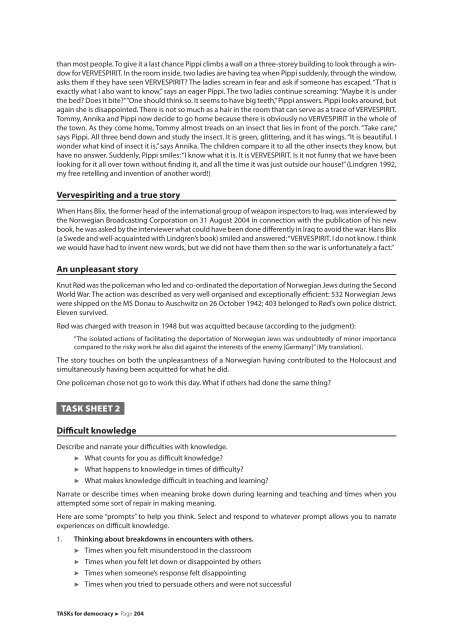TASKs for democracy
4NYw4W
4NYw4W
You also want an ePaper? Increase the reach of your titles
YUMPU automatically turns print PDFs into web optimized ePapers that Google loves.
than most people. To give it a last chance Pippi climbs a wall on a three-storey building to look through a window<br />
<strong>for</strong> VERVESPIRIT. In the room inside, two ladies are having tea when Pippi suddenly, through the window,<br />
asks them if they have seen VERVESPIRIT? The ladies scream in fear and ask if someone has escaped. “That is<br />
exactly what I also want to know,” says an eager Pippi. The two ladies continue screaming: “Maybe it is under<br />
the bed? Does it bite?” “One should think so. It seems to have big teeth,” Pippi answers. Pippi looks around, but<br />
again she is disappointed. There is not so much as a hair in the room that can serve as a trace of VERVESPIRIT.<br />
Tommy, Annika and Pippi now decide to go home because there is obviously no VERVESPIRIT in the whole of<br />
the town. As they come home, Tommy almost treads on an insect that lies in front of the porch. “Take care,”<br />
says Pippi. All three bend down and study the insect. It is green, glittering, and it has wings. “It is beautiful. I<br />
wonder what kind of insect it is,” says Annika. The children compare it to all the other insects they know, but<br />
have no answer. Suddenly, Pippi smiles: “I know what it is. It is VERVESPIRIT. Is it not funny that we have been<br />
looking <strong>for</strong> it all over town without finding it, and all the time it was just outside our house!” (Lindgren 1992,<br />
my free retelling and invention of another word!)<br />
Vervespiriting and a true story<br />
When Hans Blix, the <strong>for</strong>mer head of the international group of weapon inspectors to Iraq, was interviewed by<br />
the Norwegian Broadcasting Corporation on 31 August 2004 in connection with the publication of his new<br />
book, he was asked by the interviewer what could have been done differently in Iraq to avoid the war. Hans Blix<br />
(a Swede and well-acquainted with Lindgren’s book) smiled and answered: “VERVESPIRIT. I do not know. I think<br />
we would have had to invent new words, but we did not have them then so the war is un<strong>for</strong>tunately a fact.”<br />
An unpleasant story<br />
Knut Rød was the policeman who led and co-ordinated the deportation of Norwegian Jews during the Second<br />
World War. The action was described as very well organised and exceptionally efficient: 532 Norwegian Jews<br />
were shipped on the MS Donau to Auschwitz on 26 October 1942; 403 belonged to Rød’s own police district.<br />
Eleven survived.<br />
Rød was charged with treason in 1948 but was acquitted because (according to the judgment):<br />
“The isolated actions of facilitating the deportation of Norwegian Jews was undoubtedly of minor importance<br />
compared to the risky work he also did against the interests of the enemy [Germany]” (My translation).<br />
The story touches on both the unpleasantness of a Norwegian having contributed to the Holocaust and<br />
simultaneously having been acquitted <strong>for</strong> what he did.<br />
One policeman chose not go to work this day. What if others had done the same thing?<br />
TASK SHEET 2<br />
Difficult knowledge<br />
Describe and narrate your difficulties with knowledge.<br />
<br />
<br />
<br />
What counts <strong>for</strong> you as difficult knowledge?<br />
What happens to knowledge in times of difficulty?<br />
What makes knowledge difficult in teaching and learning?<br />
Narrate or describe times when meaning broke down during learning and teaching and times when you<br />
attempted some sort of repair in making meaning.<br />
Here are some “prompts” to help you think. Select and respond to whatever prompt allows you to narrate<br />
experiences on difficult knowledge.<br />
1. Thinking about breakdowns in encounters with others.<br />
<br />
<br />
<br />
Times when you felt misunderstood in the classroom<br />
Times when you felt let down or disappointed by others<br />
Times when someone’s response felt disappointing<br />
Times when you tried to persuade others and were not successful<br />
<strong>TASKs</strong> <strong>for</strong> <strong>democracy</strong> Page 204


